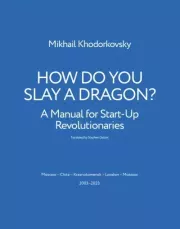Mikhail Khodorkovsky - HOW DO YOU SLAY A DRAGON?
 | Название: | HOW DO YOU SLAY A DRAGON? |
Автор: | Mikhail Khodorkovsky | |
Жанр: | Старинная литература | |
Изадано в серии: | неизвестно | |
Издательство: | неизвестно | |
Год издания: | 2022 | |
ISBN: | неизвестно | |
Отзывы: | Комментировать | |
Рейтинг: | ||
Поделись книгой с друзьями! Помощь сайту: донат на оплату сервера | ||
Краткое содержание книги "HOW DO YOU SLAY A DRAGON?"
Right at the start of this book, I had a great surprise. I know Mikhail Khodorkovsky’s story well. I reported for the BBC on his rise to prominence in the YUKOS oil company, his disputes with the newly-elected Russian President, Vladimir Putin, in the first years of the twenty-first century, and his arrest on trumped-up charges in October 2003 and subsequent imprisonment. Four days after his arrest I was due to have a meeting with him in Moscow. Instead, a meeting was arranged with a representative of the Russian Prosecutor’s Office to explain the arrest. The trial hadn’t yet begun. But the outcome was already evident.
Читаем онлайн "HOW DO YOU SLAY A DRAGON?". [Страница - 53]
So the search for justice must itself be done in a balanced way. We have to find a balance for the balance, so as not to turn history into an hour glass, using a revolution to turn it over from time to time. Every time that we have the intention to “destroy the world to its foundations by violence, then build our new world”, we are simply – like in the joke quoted above – “making our own Kalashnikov rifle”, that we use over and over again to destroy both Russian civil society and the green shoots of a state governed by the rule of law.
So that we don’t repeat this, we must put spontaneous searches for justice inside a framework. I think that this framework can be constructed in only one way: by combining it with a moral principle that’s even deeper and more universal than justice.
For me, this principle is mercy.
Mercy is the ability to empathise and to forgive; it’s the second level of justice. If we measure politics and the law by justice, then we use mercy to measure justice itself, by not allowing it to turn into its opposite.
The irony of history is that most promises to build a more just world usually end up with the building of a “just” concentration camp. Justice for some quickly turns dialectically into harsh injustice for others. Each time, the restoration of justice becomes an expensive project, and those seeking it end up paying for it, as do subsequent generations.
If we want to avoid repeating this history, we have to acknowledge that naked justice and naked truth are never as attractive as we might wish them to be. It’s only when we apply mercy that we have the opportunity to turn our clever solutions into wise ones. These may seem to be mere words. They are not. They are an attempt to put forward an alternative point of reference for considering and solving the most important practical questions of our political life.
What direct consequences could there be in the discussion on Russia’s future if we place justice, proven by mercy, at the forefront? There are quite a few.
Firstly, the clear division between “us” and “them” disappears. “We are the holy ones, they are the fiends from hell.” If we understand not only ourselves but others, too, we cannot draw such a line.
We have all, to some extent or another, been responsible for what has happened “with our Motherland and ourselves”. Some because they have taken part in events, others because they’ve failed to take part in events. No one is completely right, and no one is completely guilty. There is no “Great Wall of China” in the issue of responsibility between the beneficiaries of the regime and its victims.
From the point of view of revolutionary justice there are two camps: we’ve been made to suffer, now it’s your turn. From the point of view of mercy, there is one society, one nation, one people. Yes, they’re sick. They’re suffering from low morale and cultural degradation. But to a greater or lesser degree this affects everyone. There are very few nowadays who can put themselves in the position of being the one without sin who can cast the first stone.
Secondly – and this follows on from the first point – before we can demand change from others we have to be prepared to change ourselves. Each of us has inside us some poison that we have to squeeze out of ourselves.
If society’s energy is all focussed solely on searching for and punishing “the guilty”, while we ourselves remain unchanged, then nothing good will come out of this battle for justice. It’s only if we’re prepared to be more honest with ourselves and more tolerant towards those who are different from us, that we can avoid falling into yet another social extremism, simply replacing one lot of satraps and thieves with another lot.
A third point, developing this idea further, history shows that forgiveness can sometimes be cheaper than punishment. If given free rein, the natural and just desire for revenge turns into an all-engulfing fire, destroying not only those on whom we seek revenge, but ourselves, too. Revenge, including social and political revenge, should never become the dominant idea in society, its all-consuming passion. If it does, you will never escape trouble. When we’re blaming and scourging the regime, which is considered an essential element of cleaning it out, we must nevertheless remember that forgiveness is more important than punishment, and that everyone has the right to repentance. You’ll never build a new society on bitterness and revenge.
Fourthly, we have to distinguish between the “first disciples” and those who “lived like everyone else”. Their role has not been identical, and thus their fate should be different. For a quarter of a century a corrupting, amoral matrix has been developing in society’s behaviour. In this matrix, good and evil, black and white, have swopped places. Tens of millions of people were drawn into this matrix and lived according to its rules. Many of these were totally unaware that they were participating in the crimes of the regime; many did, but acted not on their own initiative.
However, there were “first disciples”; those who created and nurtured this matrix. They corrupted the nation, developed the mafia state, and became its main beneficiaries. There should be a different approach to them.
Finally: we must be aware that although remaking society is harder than shooting those responsible, remaking is what we must do, convincing people to live differently, playing by the new rules.
We can’t bring down from the Moon a different race and swop those we have for “ideal citizens”. Nearly all of our officials are corrupt; not because they were born to be such monsters, but because in the matrix that developed there was no other way to operate. If you didn’t steal, you wouldn’t survive. And we can’t simply sack all of our officials in one day. The ranks of those who could do their work are very thin. If anyone were to try to do this the country would become ungovernable in an instant.
Incidentally, Lenin understood this very quickly, when within 18 months Communist Russia collapsed into ruin and starvation. Even if we could sack all the officials and put in their places new and fresh people, we would very quickly see that these new people would rob the people worse than their former “masters”. We’ve seen this in Russia more than once. Our task has to be not to sack and ostracise, but to show people how to work in a different way. And that’s much more difficult.
This all encourages me to give my thoughts on two of the most important topics in the social discussion in recent years: purges and revolution.
Purges. There is a partially justified view that the compromises of the revolution carried out by Mikhail Gorbachev and Boris Yeltsin, especially as regards the ban on the activities of the Communist Party and the purge of members of the USSR KGB, played a significant role in the history of post-Communist Russia and led us to where we are now. This seems entirely plausible, considering the role that former members of the KGB played at the start of the twenty-first century in decisively
--">Книги схожие с «HOW DO YOU SLAY A DRAGON?» по жанру, серии, автору или названию:
 |
| George R R Martin - The Rise of the Dragon Жанр: Старинная литература Год издания: 101 |
| Mikhail Khodorkovsky - How Do You Slay A Dragon Жанр: Старинная литература Год издания: 2022 |


